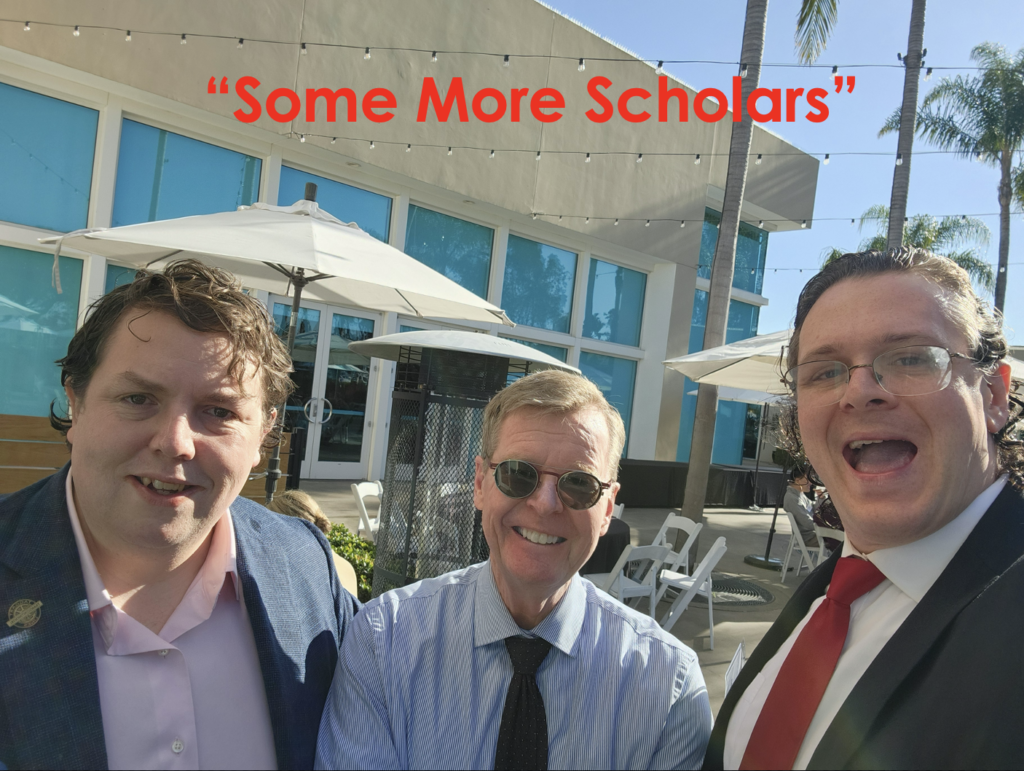The Volokh Conspiracy
Mostly law professors | Sometimes contrarian | Often libertarian | Always independent
Blackman & Baude & Paulsen at San Diego Originalism Works-in-Progress Conference
"Some more scholars" talk about Section 3
On Thursday, the Supreme Court heard oral argument in Trump v. Anderson. As much fun as the arguments were, there was very little actual discussion of Section 3. There were only a handful of questions about insurrection, and only two of the Justices seemed interested in the office- and officer-issue. The real Section 3 oral argument, as far as I'm concerned, occurred in San Diego today at the Fifteenth Annual Originalism Works-in-Progress Conference. (This what Will meant at the FedSoc convention when he said "See you in San Diego.")
This gathering is one of my favorite every year. The Center for the Study of Constitutional Originalism at the University of San Diego selects several papers that focus on all aspects of originalism. The authors provide a short discussion of their paper (about 10 minutes), a commentator provides some comments (about 7 minutes), followed by about an hour of questions and answers. Unlike many (most?) conferences, there is a norm of attendees reading all of the papers. And the questions are extremely probing.
This year, Professors Mike Rappaport and Mike Ramsey, put on a double feature about Section 3. Now, when the panel was schedule, we didn't anticipate it would be 48 hours after the Supreme Court heard oral argument. But the timing worked out quite well. Will Baude and Mike Paulsen present The Sweep and Force of Section 3, and I presented Sweeping and Forcing the President into Section 3. (Seth could not make the trip.) The format was Paulsen for ten minutes, Blackman for ten minutes, Baude for seven minutes, Blackman for seven minutes, followed by about 90 minutes of Q&A. It was fairly intense. The levels of sophistication of the questions, and answers at this session, dwarfed what we saw at One First Street on Thursday. The recording will be released sometime soon, though probably not before the Supreme Court decides Trump v. Anderson. In the interim, You can download my slides here.
I may blog about several of the questions I received. But here, I'd like to thank Will and Mike for being generous sparring partners. Even where we disagree, we can do so respectfully. If Seth and I are "some scholars," then Will, Mike, and I are just "some more scholars."

Editor's Note: We invite comments and request that they be civil and on-topic. We do not moderate or assume any responsibility for comments, which are owned by the readers who post them. Comments do not represent the views of Reason.com or Reason Foundation. We reserve the right to delete any comment for any reason at any time. Comments may only be edited within 5 minutes of posting. Report abuses.
Please to post comments


If Blackman has ever evaluated any historical occurrence in any context but benighted presentism, can anyone show an example? It takes something approaching historical idiocy to insist that the meaning of a Civil War era text can be read against Civil War era context, because that contrary reading is necessary to reach a conclusion in modern-era jurisprudence—which nobody in the Civil War era had any inkling of.
Blackman continues to fight one of the easiest historical context problems ever posed—the question whether Republicans immediately post Civil War intended for insurrectionists to be disqualified from re-taking federal office—when Republicans victorious over insurrectionists forced an amendment to the Constitution which says not only that insurrectionists are disqualified, but also specifies a procedure to lift an already-existing disqualification if Congress elects to do it.
Blackman does not merely ignore historical context, he contradicts it. Blackman does not merely ignore historical text, he contradicts it. Black man is, de facto, anti-originalist, and anti-textualist, while indulging himself as a poseur to the contrary of both.
If at any time hence there is suggestion that the Supreme Court was influenced by Blackman's nonsense, historians of that era will recoil from intrusive and incongruous implications that the Court was so incompetent, or so corrupt. Those historians will find it easier, and far more plausible, to look elsewhere for insight into the Court's decision in Trump v. Anderson. And that is what they will do.
All this voluminous stuff by Blackman will later be referenced in some footnote mentioning in passing the Trump personality cult and its deranged supporters. Unknown to us now, of course, is whether that footnote will be reduced to triviality by the failure of the Trump cult, or elevated to significance if the cult achieves disastrous triumph over American constitutionalism. Blackman seems, with paradoxical anti-wisdom, to be betting on the latter.
If Blackman were thoughtful, he would give thought to whether promotion of Trump's cult is a constructive use of his egregious energy.
Historians will describe originalism (at least, as promoted by current Federalist Society right-wingers) as less popular than Kim Kardashian, less influential than Kim Kardashian, less important than Kim Kardashian, less attractive than Kim Kardashian, less useful than Kim Kardashian -- but a few months older than Kim Kardashian.
The culture war's winners -- not a receding, disaffected fringe of legal academia -- will determine originalism's future and legacy. I hope to see Justice Brennan's observation -- originalism is "arrogance cloaked as humility" -- featured on originalism's tombstone.
How many faculty from the liberal-libertarian mainstream attended the San Diego clingerfest? That's how many faculty will be teaching originalism as anything beyond a historical curiousity a few decades from now.